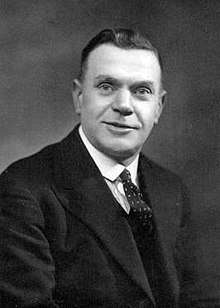George Tomlinson
George Tomlinson (21 March 1890 – 22 September 1952) was a British Labour Party politician.
George Tomlinson MP | |
|---|---|
 | |
| Minister of Education | |
| In office 7 February 1947 – 26 October 1951 | |
| Prime Minister | Clement Attlee |
| Preceded by | Ellen Wilkinson |
| Succeeded by | Florence Horsbrugh |
| Minister of Works | |
| In office August 1945 – February 1947 | |
| Prime Minister | Clement Attlee |
| Preceded by | Duncan Sandys |
| Succeeded by | Charles Key |
| Member of Parliament for Farnworth | |
| In office 1938–1952 | |
| Preceded by | Guy Rowson |
| Succeeded by | Ernest Thornton |
| Personal details | |
| Born | 21 March 1890 Rishton, Lancashire |
| Died | 22 September 1952 (aged 62) Manor House Hospital, Golders Green, London |
| Political party | Labour |
| Spouse(s) | Ethel, née Pursell (m. 1914)[1] |
| Children | one daughter[1] |
Biography
George Tomlinson was born at 55 Fielding Street in Rishton, Lancashire, the son of John Tomlinson, a cotton weaver, and his wife Alice, née Varley. He was educated in Rishton at Wesleyan Elementary School.[2]
At the age of 12 he took work as weaver at a cotton mill, working half-time the first year before becoming a full-timer. In 1912 he was elected president of the Rishton district of the Amalgamated Weavers' Association.[2]
Tomlinson married the cotton weaver Ethel Pursell on 4 September 1914 and together they had a daughter.[1]
He was a conscientious objector in the First World War, working on the land for three years.
He was elected Member of Parliament for the Farnworth constituency in Lancashire at a by-election in 1938 and held the seat until his death in 1952, aged 62. He was joint Parliamentary Secretary under Ernest Bevin in the Ministry of Labour and National Service from February 1941 to May 1945 in Winston Churchill's wartime Coalition Government. In Clement Attlee's post-war Labour government he was Minister of Works, August 1945 – February 1947, and Minister of Education, February 1947 – October 1951, following the death of Ellen Wilkinson.
In 1944 Tomlinson was a British delegate at the International Labour Conference held at Philadelphia in the United States.[1]
A biography of Tomlinson written by Fred Blackburn, a fellow Labour politician and Member of Parliament for Stalybridge and Hyde, was published by Heinemann in 1954. The biography, which features a foreword by Clement Attlee, is largely based on talks Blackburn had with Tomlinson before his death.
The George Tomlinson School, which opened in Kearsley the year following his death, was named in his memory. The school converted to academy status in 2010 and was renamed Kearsley Academy.[3]
References
- Mitchell 1995, p. 970
- "George Tomlinson". Links in a Chain - The Mayors of Bolton. Bolton Council. 2012. Retrieved 22 January 2015.
- "End of an era as school prepares to reopen as an academy". The Bolton News. 25 July 2010. Retrieved 22 January 2015.
- Bibliography
- Mitchell, Andrew (1995). "Tomlinson, George". In Lane, A. Thomas (ed.). Biographical Dictionary of European Labor Leaders. Volume 2, M–Z. Westport, Connecticut: Greenwood Press. p. 970. ISBN 0-313-29900-5.CS1 maint: ref=harv (link)
Further reading
- Blackburn, Fred (1954). George Tomlinson: A Biography. London: Heinemann.
- Dean, D. W. (1986). "Planning for a postwar generation: Ellen Wilkinson and George Tomlinson at the Ministry of Education, 1945–51". History of Education. The History of Education Society. 15 (2): 95–117. doi:10.1080/0046760860150204.
External links
- Hansard 1803–2005: contributions in Parliament by George Tomlinson
- Newspaper clippings about George Tomlinson in the 20th Century Press Archives of the ZBW
| Parliament of the United Kingdom | ||
|---|---|---|
| Preceded by Guy Rowson |
Member of Parliament for Farnworth 1938–1952 |
Succeeded by Ernest Thornton |
| Political offices | ||
| Preceded by Duncan Sandys |
Minister of Works 1945–1947 |
Succeeded by Charles Key |
| Preceded by Ellen Wilkinson |
Minister of Education 1947–1951 |
Succeeded by Florence Horsbrugh |
.svg.png)